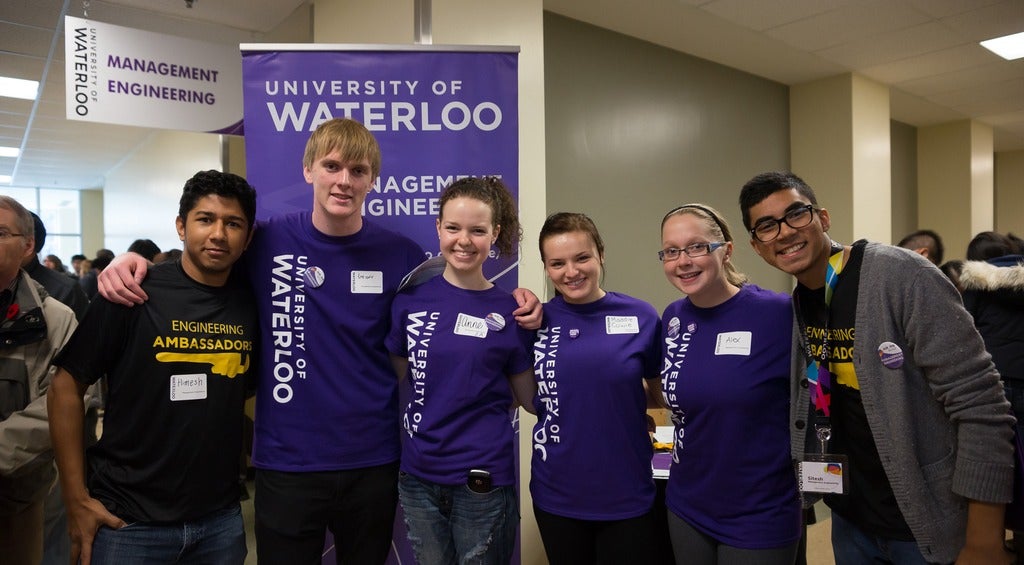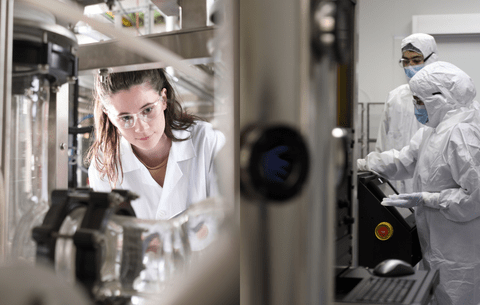Waterloo Engineering welcomes future students and their families to visit us to discover our undergraduate programs, campus, student life and more at this year's Fall Open House!
Parents
In chemical engineering and nanotechnology engineering, you'll impact many industries, ranging from medical to pharmaceuticals, electronics to automotive, and a variety of consumer goods! On Thursday, December 9 at 7:00 PM ET, learn how students in these two programs are engineering the world all around us.
Future undergraduate engineering students are invited to join us for an admissions-focused webinar that will focus on the admissions process and cover topics like how to apply, tips for your Admissions Information Form (AIF), and more!
Our panellists will include our Director/Associate Director of Admissions as well as current students who successfully went through the process themselves.
Nanotechnology innovation at Capstone Design Symposium
At the 11th annual Capstone Design Symposium on March 26th, the Nanotechnology Engineering program’s class of 2021 presented their fourth-year design projects to an enthusiastic audience. Students, faculty, friends and family members joined online to learn about the exciting innovations created by our fourth-year students.
UWaterloo researchers awarded $2 million to create Ontario Centre for Battery and Electrochemical Research
Zhongwei Chen, Canada Research Chair in Advanced Materials for Clean Energy and Chemical Engineering Professor and Linda Nazar, Canada Research Chair in Solid State Energy Materials and Chemistry Professor, received more than $2 million in infrastructure funding from the federal government’s Canada Foundation for Innovation for the proposed Ontario Centre for Battery and Electrochemical Research.
Future undergraduate engineering students are invited to join us for a special webinar for students interested in Chemical or Nanotechnology Engineering. You will hear directly from current students, alumni, and professors to learn more about these programs, career opportunities, and the ways chemical and nanotechnology engineers are helping to solve the challenges caused by the COVID-19 pandemic.
NE Alumni Profile: Alisha Bhanji, Class of 2020
Just last spring, Alisha Bhanji (BASc 2020) was working with her Capstone Design team to finalize the liquid crystal technology behind their fourth-year design project. Now, as Co-Founder & Chief Engineering Officer of Scope Photonics, Alisha and her colleagues are taking it to market via their startup company.
Their camera lenses can instantly, and without digital cropping or physical movement, adjust their optical behaviour to take the perfect photo in any condition. With a potential market that stretches far beyond smartphones, their technology shows great promise. They’ve accomplished a rapid series of exciting achievements, including several big-name awards and unique opportunities, that have them poised for success.
UWaterloo ranks in the world's top 100 for nanoscience and nanotechnology
The University of Waterloo cracked the top 100 in worldwide rankings in a subject area that heavily involves nanotechnology engineering.
Although media company US News and World Report didn't include a specific category for nanotechnology engineering in its Best Global Universities rankings for 2021, Waterloo took the 82nd spot in a subject area covering nanoscience and nanotechnology, making us one of the best ranked Canadian universities in this subject.
Nanotechnology Engineering team shortlisted in global Dyson finals
A team of former Nanotechology Engineering students has made a shortlist of finalists in a high-profile international invention competition.
Scope, which is developing a better zoom function for smartphones and other applications, is one of 20 teams from countries around the world still in the running for the 2020 James Dyson Award.
NE alumni win global runner-up prize in James Dyson Award competition
NE alumni startup Scope won the International Runner-up prize in the 2020 James Dyson Award, a global competition for student inventors.
- Currently on page 1 1
- Next page

